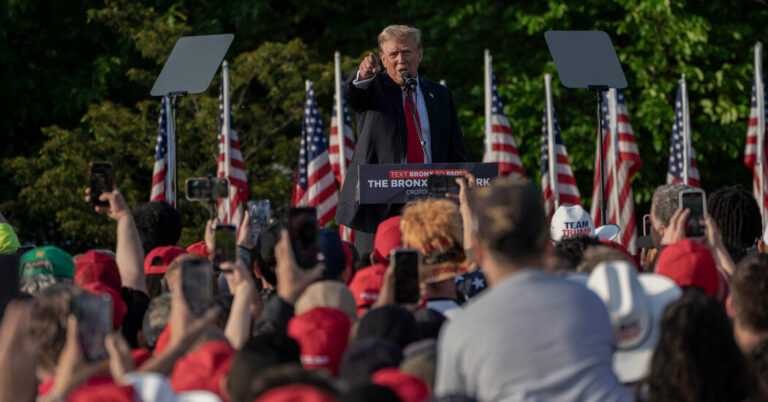Federal prosecutors asked the judge overseeing former President Donald J. Trump’s classified documents case Friday evening to bar him from making statements that could endanger law enforcement officers involved in the procedure.
Prosecutors filed the request after Mr. Trump made claims they called “grossly misleading” about the FBI’s August 2022 search of Mar-a-Lago, his private club and his Florida residence. This week, the former president falsely suggested that the FBI was authorized to shoot him when agents discovered more than 100 classified documents while executing a court-approved search warrant.
In a social media post Tuesday, Mr. Trump falsely claimed that President Biden “authorized the FBI to use deadly (deadly) force” during the search.
Mr. Trump’s message came in response to a FBI Operational Plan for the Mar-a-Lago search which was unsealed Tuesday as part of a legal request filed by Mr. Trump’s lawyers. The plan contained a all-purpose reference with deadly force being authorized in an emergency, something prosecutors said Mr. Trump seriously misrepresented.
“As Trump is well aware, the FBI took extraordinary care to execute the search warrant discreetly and without unnecessary confrontation,” prosecutors wrote in a motion to Judge Aileen M. Cannon, who is overseeing the case. classified documents.
“They scheduled the search of Mar-a-Lago at a time when he and his family would be away,” prosecutors added. “They planned to coordinate with Trump’s attorney, Secret Service agents, and Mar-a-Lago staff before and during the execution of the warrant; and they planned for contingencies – which, in fact, never happened – about who to contact should Trump arrive on the scene.
The request to Judge Cannon was the first time prosecutors from Special Counsel Jack Smith’s office had sought to restrict Mr. Trump’s public statements in the classified documents case. But Mr. Trump, who has repeatedly attacked witnesses, court officials and others in his four criminal proceedings, is under a silence order in two of his three other cases.
Prosecutors did not seek to silence Mr. Trump in the classified documents case, but instead asked Judge Cannon to revise his conditions of release to prohibit him from making public comments “that pose a significant danger , imminent and predictable for the law.” law enforcement officers participating in the investigation.
However, if Judge Cannon grants the request, it would mean that Mr. Trump could be taken into custody if he violates the revised conditions.
Mr. Trump’s lawyers objected to the request and complained that it was made on a holiday weekend, according to the motion filed by prosecutors. The lawyers did not immediately respond to a message seeking comment.
Mr. Smith’s team has been in recent days shows signs of losing patience with Mr. Trump and his lawyers. And the former president’s “intentionally false and inflammatory statements” about the Mar-a-Lago search, as prosecutors put it, seemed to cross a line, demanding a serious response.
As a preliminary matter, prosecutors explained in their motion to Judge Cannon that the deadly force language Mr. Trump misrepresented was a “standard and unimpeachable” provision commonly used in “countless warrants across the country.”
The measure explicitly states that deadly force is prohibited except in cases of “imminent danger of death or serious bodily injury” and is included in warrants to restrict the use of weapons during searches.
But prosecutors said Mr. Trump had “grossly misrepresented these standard practices by falsely portraying them as a plan to kill him, his family and U.S. Secret Service agents.”
By falsely suggesting that FBI agents “were complicit in a plot to assassinate him,” prosecutors wrote, Mr. Trump exposed them “to the risk of threats, violence and harassment.”
“These misleading and inflammatory claims irresponsibly put a target on the backs of the FBI agents involved in this matter, as Trump well knows,” prosecutors wrote.
To bolster their argument, prosecutors reminded Judge Cannon that days after the Mar-a-Lago search — a legal investigative move that Mr. Trump condemned on social media as an attack on him — a gunman in Ohio had tried to force his way into Ohio. an FBI field office near Cincinnati.
The man, Ricky W. Shiffer, said at the time that “patriots” should go to Florida to defend Mr. Trump and kill FBI agents. Mr. Shiffer was ultimately killed in shootout with local police.
Mr. Trump is already facing silence in another federal case in Washington, where he is accused of plotting to overturn the 2020 election. That case has been on hold for months as the Supreme Court considers the Mr. Trump’s claim that he is immune from the charges because they stem from actions he took while president.
Mr. Trump is also under a gag order at his trial in Manhattan, where he was accused of concealing a hush money payment to a porn star made on the eve of the 2016 election. The judge who supervises this procedure has twice scorned Mr. Trump and fined him $10,000 for threatening witnesses and jurors in the case.


